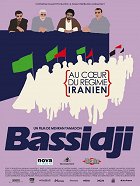Réalisation:
Mehran TamadonScénario:
Mehran TamadonActeurs·trices:
Mehran TamadonRésumés(1)
Sur une colline, des hommes, des femmes en tchador et des enfants déambulent dans un vaste “musée” en plein air dressé en mémoire des martyrs de la guerre Iran-Irak. C'est le nouvel an iranien, nous sommes près de la frontière irakienne. Un homme me guide. Il est grand et charismatique et s’appelle Nader Malek-Kandi. Pendant près de trois ans, j’ai choisi de pénétrer au coeur du monde des défenseurs les plus extrêmes de la République islamique d'Iran (les bassidjis), pour mieux comprendre les paradigmes qui les animent. Nous venons du même pays, et pourtant, tout nous oppose: Iranien habitant en France, athée et enfant de militants communistes sous le Shah, j’ai tout pour heurter les convictions de ceux qui respectent les dogmes du régime. Un dialogue se noue pourtant. Mais entre les jeux de séduction et de rhétorique, les moments de sincérité et la réalité du système politique et religieux qu'ils défendent, jusqu’où nos convictions respectives sont-elles prêtes à s’assouplir pour comprendre qui est l’autre ? (Aloest Distribution - Juste Distribution)
(plus)Critiques (1)
I have three issues with this documentary, and two specific objections because the fact that I know a lot about the issue at hand and therefore the content of the film is not surprising or enriching for me is exclusively my problem. Firstly, the film is terribly drawn out. With some films giving you the feeling that they could be cut by 15-20 minutes, here I would be much more radical and after fighting sleep several times, I would cut it in half. The majority of shots are prolonged. Secondly, Tamadon's film is incredibly meek, as the director performs ritual dances and tiptoes where he should get straight to the point. It got to the point where one of the interviewees criticized him for this caution, saying that he expected more direct questions. This is connected to the fact that Tamadon primarily interviews the intellectually equipped and accommodating part of the community he is interested in, which flattens, or rather prevents, a more comprehensive view. Things are different when you talk to a religious scholar and when you encounter harassment from an uneducated militia member who bothers you on the street. For inhabitants of a small state in Central Europe, known for religious indifference and relativization of values, it is of course quite exotic to look at a society that not only has rules but also professes some values, even if they are problematic from our perspective. Overall impression: 40%.
()

